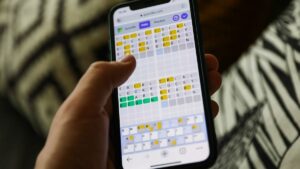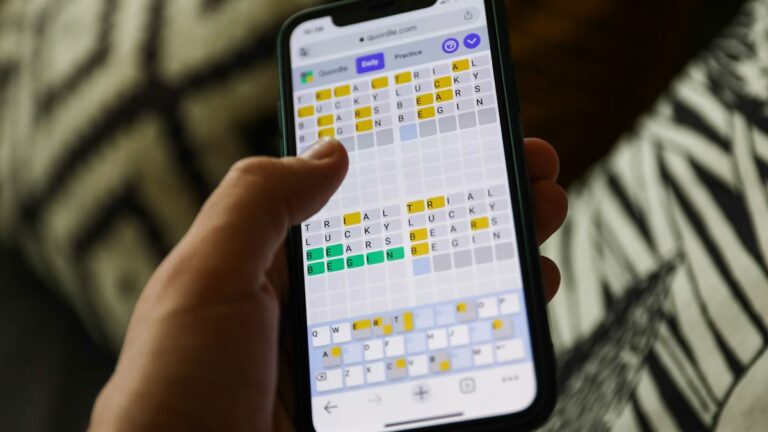Christmas in space? NASA astronauts Sunita “Suni” Williams and Barry “Butch” Wilmore surely didn’t think they’d still be on the International Space Station for Christmas when they left Earth in June. In fact, they initially planning to stay for just eight days. And now, what had been planned as a February return has been moved to late March.
But the two stranded astronauts, plus fellow astronauts Nick Hague and Don Pettit, recently sent Christmas greetings down to Earth with social-media photos and video showing the space travelers wearing holiday headgear.
One Instagram image shows Pettit and Williams wearing Santa hats. And in a video, Williams, Wilmore, Pettit and Hague are seen posing with a snowman figure and a small decorated tree, while the three men wear Santa hats and Williams wears reindeer antlers.
Each one takes turns speaking about their holiday in orbit, letting candy canes float around them, showing off the canned food they’ll be enjoying, and also using the weightlessness of microgravity to float the microphone to the next speaker.
“It’s a great time of year up here,” says Williams. “We get to spend it with all of our ‘family’ up on the International Space Station, there’s seven of us up here, and so we’re going to get to enjoy company together.”
Christmas conspiracy theory?
Numerous people who watched the video or saw the images wondered about why the ISS had Christmas decorations.
“8 day mission that’s turned into months long and they’ve somehow got Christmas hats?” asked one commenter.
Other commenters pointed out that the ISS didn’t simply spring into existence in June, when Williams and Wilmore arrived. In fact, Williams spent Christmas 2006 in space as well.
NASA confirmed to the New York Post that the Santa hats, plus Christmas decorations, food and presents for the crew, were delivered in late November via the SpaceX spacecraft. ISS supplies are regularly replenished via such deliveries.
February return is now March
Recently, NASA pushed back Williams and Wilmore’s return to Earth from February to late March.
“NASA and SpaceX assessed various options for managing the next crewed handover, including using another Dragon spacecraft and manifest adjustments,” according to a NASA press release issued on Dec. 17. “After careful consideration, the team determined that launching Crew-10 in late March, following completion of the new Dragon spacecraft, was the best option for meeting NASA’s requirements and achieving space station objectives for 2025.
The delay is so NASA and SpaceX teams can complete work on the mission’s new Dragon spacecraft. That new craft will launch four crew members to the ISS — commander Anne McClain, commander, pilot Nichole Ayers, Japanese astronaut Takuya Onishi, and Roscosmos cosmonaut Kirill Peskov. Once the new crew is settled, Williams, Wilmore, NASA astronaut Nick Hague and Roscosmos cosmonaut Aleksandr Gorbunov will return to Earth.
But Williams and Wilmore aren’t complaining about their extended stay.
“I like everything about being up here,” Williams said in early December. “Living in space is super fun.”
The astronauts are keeping busy, with Williams and Wilmore assisting the other ISS residents in space botany studies and other research, according to NASA’s ISS blog. They have aided in more than 60 scientific studies in their nearly six months on board, the Washington Post reports.
Here’s what you need to know about what the two astronauts are up to.
Who are the astronauts?
Wilmore, 61, and Williams, 58, are veteran astronauts and are both naval officers and former test pilots. Williams has been a NASA astronaut since 1998, and Wilmore since 2000. Both have plenty of experience in space.
Williams is the former record holder for most spacewalks by a woman (seven) and most spacewalk time for a woman (50 hours, 40 minutes), and in 2007, she ran the first marathon by any person in space.
In 2009, Wilmore piloted the Space Shuttle Atlantis on its mission to the ISS, and in 2014, he was part of the ISS crew that used a 3D printer to manufacture a tool — a ratchet wrench — in space, the first time humans manufactured something off-world.
What was their original mission in space?
Wilmore, as commander, and Williams, as pilot, traveled to the ISS on a 15-foot-wide, Boeing-made capsule called Starliner. They launched on June 5 and docked with the ISS on June 6. NASA hopes Starliner will give the organization a new way to get crews to and from the ISS, and the fact that it’s Boeing-made is another sign that NASA is starting to lean on the private sector for its human spaceflight options, The New York Times reported.
Wilmore and Williams’ ISS mission was supposed to last a mere eight days, during which they’d test out aspects of Starliner and see how it operates with a human crew in space. But due to complications with Starliner, the two astronauts are still up there.
What are the astronauts eating?
Food on the ISS is a major focus, as fresh produce must be replenished every three months with deliveries from Earth. On Nov. 23, the unpiloted Progress 90 resupply spacecraft successfully docked to the ISS. But the latest food delivery came with an unwanted smell.
“After opening the Progress spacecraft’s hatch, the Roscosmos cosmonauts noticed an unexpected odor and observed small droplets, prompting the crew to close the Poisk hatch to the rest of the Russian segment,” a NASA representative said in a statement posted to social media.
“Space station air scrubbers and contaminant sensors monitored the station’s atmosphere following the observation, and on Sunday, flight controllers determined air quality inside the space station was at normal levels,” NASA said. “There are no concerns for the crew, and as of Sunday afternoon, the crew is working to open the hatch between Poisk and Progress while all other space station operations are proceeding as planned.”
NASA revealed that their menu includes cereal with powdered milk, pizza, shrimp cocktails, roast chicken and tuna.
The smell that came along with the spacecraft isn’t the only food-related concern of late, with some publications questioning the astronauts’ thin appearance based on recent photos.
Dr. J.D. Polk, NASA chief health and medical officer, made an official statement saying Williams and Wilmore are just fine. “NASA and our partners have safely conducted long duration missions aboard the orbital laboratory for decades, studying the effects of space on the human body as we prepare for exploration farther into the solar system,” Polk said. “Crew health is regularly monitored by dedicated flight surgeons on Earth, and they have an individual diet and fitness regime to ensure they remain healthy throughout their expeditions.”
Williams said she weighs the same as she did when she reached the space station, in a video interview conducted Nov. 12 on the ISS.
What are the astronauts saying?
The astronauts have been positive about their experience. At a live news conference in September, Williams said that despite knowing their mission was scheduled to take only eight days, they’d both been “training for a number of years” for it. They’re fully qualified to remain in space for an extended period of time, and to help pilot the SpaceX Dragon spacecraft that’ll bring them home next year.
“It’s very peaceful up here,” Williams said on Sept. 13, though she added that they miss their families back on Earth.
The astronauts are working on research, maintenance and data analysis during their extended stay.
“We are having a great time here on ISS,” Williams said in a news conference held from orbit in July. “I’m not complaining. Butch isn’t complaining that we’re up here for a couple of extra weeks.”
Wilmore and Williams responding to media questions back in March.
How did they get stuck in space in the first place?
The Starliner was delayed in May due to a problem with a valve in the rocket. Then engineers had to fix a helium leak. That’s all bad news for Boeing. It’s competing with SpaceX, which has been transporting astronauts to the ISS since 2020, making over 20 successful trips to the space station.
Starliner finally launched, atop an Atlas V rocket, on June 5, but some problems came along with it. NASA announced that three helium leaks were identified, one of which was known before flight, and two new ones. In addition to the leaks, the crew had to troubleshoot failed control thrusters, though the craft was able to successfully dock with the ISS.
SpaceX has had failures too. A Falcon 9 rocket exploded on the launchpad in 2016. In July of this year, a Falcon 9 rocket experienced a liquid oxygen leak and deployed its satellites in the wrong orbit, The New York Times reported. And a Falcon 9 rocket in late August lost a first-stage booster when it toppled over into the Atlantic Ocean and caught fire.
But that said, SpaceX has more than 300 successful Falcon 9 flights to its credit.
Stuck in space: A timeline
- May: Starliner launch delayed due to a problem with a valve in the rocket, and then a helium leak.
- June 5: Starliner launches with Williams and Wilmore on board.
- June 6: Starliner docks with ISS despite dealing with three helium leaks and failed control thrusters.
- Sept. 6: Starliner departs ISS and lands in New Mexico, leaving Williams and Wilmore behind.
- Sept. 28: SpaceX Crew-9 mission launches with Hague and Gorbunov on a Dragon spacecraft.
- Sept. 29: SpaceX Dragon docks with ISS.
- Dec. 17: NASA announces the launch of four crew members to the ISS will be delayed from February to late March.
- March 2025 onward: SpaceX Dragon spacecraft will return to Earth with Williams, Wilmore, Hague and Gorbunov.



















+ There are no comments
Add yours